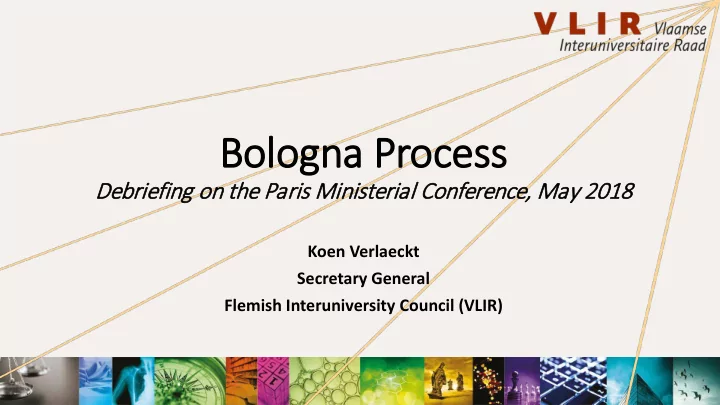

Bolog ogna a Proce ocess Debriefing o on th the P Paris Ministerial Conference ce, M May 2 2018 Koen Verlaeckt Secretary General Flemish Interuniversity Council (VLIR)
Ministeri rial confer eren ence in Paris • 24-25 May 2018 • 20 years after the Sorbonne Declaration, 30 years after the Magna Charta Universitatum • Main focus: • Taking stock of the Bologna process with a view to Rome 2020 • Contribute to a more cohesive and inclusive society: • enhancing intercultural understanding, civic engagement and ethical awareness; • ensuring equitable access to higher education. 18/07/2018 2
Taki king sto stock • Generally speaking, the EHEA is a success story: • increased student mobility ; • improved comparability and transparency of the higher education system • increased quality and attractiveness of the higher education systems • enhanced mutual understanding and trust • improved cooperation among higher education systems • But implementation remains uneven, both between policy areas and between countries 18/07/2018 3
Ministeri rial commi mmitments Ministers committed: • To remove obstacles in implementing the Standards and Guidelines for Quality Assurance in the EHEA tinto national and institutional practice • To enable and promote the use of the European Approach for Quality Assurance of Joint Programmes • To promote the development of the Database for External Quality Assurance Results (DEQAR) • To ensure full implementation of ECTS • To implement the Council of Europe/UNESCO Lisbon Recognition Convention (refuges and displaced persons) 18/07/2018 4
Ministeri rial approvals Ministers approved: • The inclusion of short-cycle qualifications as a stand-alone qualification • The proposed revised diploma supplement • The Belarus strategy 2018-2020 • The use of a structured peer support approach • Three-cycle system compatible with the EHEA qualification framework • Compliance with the Lisbon Recognition Convention • Quality assurance in compliance with the Standards and Guidelines for Quality Assurance in the EHEA 18/07/2018 5
Ministeri rial endorsem emen ents Ministers welcomed: • The digitalisation of the diploma supplement • The European student card initiative 18/07/2018 6
Adding cooperation i in innovative lea earnin ing an and teachning ng pract ctices ces as a new E EHEA h hallm lmark • student-centred learning + open education in the context of life-long learning • inter-disciplinary programmes • the combination of academic and work-based learning • the improvement of synergies between education, research and innovation • the use of digital and blended learning in order to enhance lifelong and flexible learning • pedagogical training, continuous professional development 18/07/2018 7
Beyond 2020: 2020: a a more ambiti tious EHEA • Establish interaction with European Research Area and Innovation Committee (ERAC) in order to develop synergies between EHEA and the European Research Area (ERA) • Contribute to meeting the UN Sustainable Development Goals (Agenda 2030) • Strengthen the social dimension of higher education • Explore all opportunities such as Erasmus+ and the Horizon 2020 research programmes • Enter into global policy dialogue 18/07/2018 8
Europ opea ean Un Univer ersities es (1) 1) • European Council conclusions of 14 December 2017: “… strengthening strategic partnerships across the EU between higher education institutions and encouraging the emergence by 2024 of some twenty European universities, consisting in bottom-up networks of universities across the EU which will enable students to obtain a degree by combining studies in several EU countries and contribute to the international competitiveness of European universities ” 18/07/2018 9
Europ opea ean Un Univer ersities es (2) 2) • Pilot phase to be launched under the Erasmus+ programme • Key considerations for the EC – European universities: • Are bottom-up alliances, that in the long run will set up new joint governance models, integrating education, research and innovation • Will be pioneers to achieve top-quality education, research and innovation • Aim at a balanced geographical coverage • Will achieve a more united and stronger European Union by promoting common European values and bringing together a new generation of Europeans 18/07/2018 10
Europ opea ean Un Univer ersities es (3) 3) • Objectives under the pilot phase: • Going beyond existing higher education cooperation models • Building a growing level of integration • Aim at excellence in innovation and entrepreneurship • Objectives in the long term (2025-2030): • Set up a European campus, with at least 50% of the students benefiting from European curricula • Set up a challenged-based university approach • Set up a joint governance model 18/07/2018 11
Europ opea ean Un Univer ersities es (4) 4) • Operational issues: • Minimum of three higher education institutions from at least three EU member states (4 to 6 partners is seen as ideal) • Deadline for applications: 28 February 2019 18/07/2018 12
Europ opea ean Un Univer ersities es (5) 5) • Reflections on outstanding issues: • Geographical balance • Commitment of DG RTD • Level of national co-funding • Politicising the concept of European universities • Risk of duplication • Language issues • Participation of university colleges • Impact of Brexit • … 18/07/2018 13
Thank you ! 18/07/2018 14
Recommend
More recommend